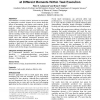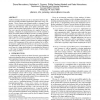544 search results - page 47 / 109 » Translating with Scarce Resources |
CHI
2004
ACM
16 years 2 months ago
2004
ACM
User attention is a scarce resource, and users are susceptible to interruption overload. Systems do not reason about the effects of interrupting a user during a task sequence. In ...
140
click to vote
EWSN
2004
Springer
16 years 1 months ago
2004
Springer
Directed diffusion is a prominent example of data-centric routing based on application layer data and purely local interactions. In its functioning it relies heavily on network-wid...
118
click to vote
ICCAD
2003
IEEE
15 years 11 months ago
2003
IEEE
Ambient Intelligent Systems provide an unexplored hardware platform for executing distributed applications under strict energy constraints. These systems must respond quickly to c...
HICSS
2009
IEEE
15 years 8 months ago
2009
IEEE
Operating systems were created to provide multiple tasks with access to scarce hardware resources like CPU, memory, or storage. Modern programmable hardware, however, may contain ...
111
click to vote
PVM
2009
Springer
15 years 8 months ago
2009
Springer
Abstract. Most parallel systems on which MPI is used are now hierarchical: some processors are much closer to others in terms of interconnect performance. One of the most common su...


